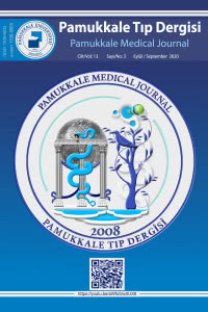Onkoloji hastalarında kemoterapi öncesi HBsAg, antiHBs ve izole antiHBc IgG pozitiflik oranları
The positivity ratios of HBsAg, anti-HBs and isolated anti-HBc IgG before chemotherapy
___
- 1. Loomba R, Liang TJ. Hepatitis B rectivation associated with suppresive and biological modifier therapies: Current concepts, management strategies, and future directions. Gastroenterology 2017;152:1297-1309. https://doi.org/10.1053/j.gastro.2017.02.009
- 2. European Association for the Study of the Liver. EASL 2017 Clinical practice guidelines on the management of hepatitis B virüs infection. J Hepatol 2017;67:370- 398. https://doi.org/10.1016/j.jhep.2017.03.021
- 3. Lubel JS, Angus PW. Hepatitis B reactivation in patients receiving cytotoxic chemotherapy; diagnosis and management. J Gastroenterol 2010;25:864-871. https://doi.org/10.1111/j.1440-1746.2010.06243.x
- 4. Yeo W, Johnson PJ. Diagnosis, prevention and management of hepatitis B reaktivation during anticancer therapy. Hepatology 2006;43;209-220. https://doi.org/10.1002/hep.21051
- 5. Reddy KR, Beavers KL, Hammond SP, Lim JK, Falck- Ytter YT. American Gastroenterological Association Institute. American Gastroenterological Association Institute guideline on the prevention and treatment of hepatitis B virus reactivation during immunosuppressive drug therapy. Gastroenterology 2015;148:215-219. https://doi.org/10.1053/j.gastro.2014.10.039
- 6. Engin B, Günay S, Binicier ÖM, Derviş Hakim G, Yıldız C, Paköz ZB. İmmünsüpresif hastalarda hepatit B virüs tarama sıklığı ve gerçek yaşam verileri. FNG & Bilim Tıp Dergisi 2016;2:256-259. https://doi.org/10.5606/ fng.btd.2016.046
- 7. Eren OO, Artac M, Boruban MC, Yavas O, Arslan U, Basaranoglu M. Chemotherapy-induced hepatitis B virus reactivation in HBsAg positive cancer patients: a single center experience. Med Oncol 2009;26:386-392. https://doi.org/10.1007/s12032-008-9133-4
- 8. Meidani M, Rostami M, Hemmati S, et al. Screening and evaluation of chronic and occult hepatitis B in chemo - radiotherapy patients with cancer. Adv Biomed Res 2016;5:85. https://doi.org/10.4103/2277-9175.182216
- 9. İnci A, Açıkgöz Ö, Kalaycı M, Ülker V. Meme ve jinekolojik kanserli hastalarda kemoterapi öncesi HBsAg, antiHBs ve izole antiHBc pozitiflik oranları. J Clin Exp Invest 2018;9:91-94. https://doi.org/10.5799/jcei.433817
- 10. Lee R, Vu K, Bell CM, Hicks LK. Screening for hepatitis B surface antigen before chemotherapy: Current practice and opportunities for improvement. Curr Oncol 2010;17:32-38.
- 11. Kose Ş, Olmezoğlu A, Gozaydın A, Ece G. Seroprevalance of hepatitis B and C among oncology patients in Turkey. J Health Popul Nutr 2011;29:652- 655.
- 12. Oguz A, Aykas F, Unal D, et al. Hepatitis B and C seroprevalence in solid tumors - necessity for screening during chemotherapy. Asian Pac J Cancer Prev 2014;15:1411-1414. https://doi.org/10.1016/j. jfma.2012.10.007
- 13. Liu JY, Sheng YJ, Ding XC, et al. The efficacy of lamivudine prophylaxis against hepatitis B reactivation in breast cancer patients undergoing chemotherapy: A meta-analysis. J Formos Med Assoc 2015;114:164- 173. https://doi.org/10.1016/j.jfma.2012.10.007
- 14. Yotsuyanagi H, Yasuda K, Moriya K, et al. Frequent presence of HBV in the sera of HBsAg-negative, anti- HBc-positive blood donors. Transfusion 2001;41:1093- 1099.
- 15. Hennig H, Puchta I, Luhm J, Schlenke P, Goerg S, Kirchner H. Frequency and load of hepatitis B virus DNA in first-time blood donors with antibodies to hepatitis B core antigen. Blood 2002;100:2637-2641. doi.org/10.1182/blood-2002-03-0798
- 16. Dreier J, Kröger M, Diekmann J, Götting C, Kleesiek K. Low-level viraemia of hepatitis B virus in an anti- HBc- and anti-HBs-positive blood donor. Transfus Med 2004;14:97-103. https://doi.org/10.1111/j.0958- 7578.2004.0486.x
- 17. Awerkiew S, Däumer M, Reiser M, et al. Reactivation of an occult hepatitis B virus escape mutant in an anti- HBs positive, anti-HBc negative lymphoma patient. J Clin Virol 2007;38:83-86. https://doi.org/10.1016/j. jcv.2006.10.006
- 18. Mikulska M, Nicolini L, Signori A, et al. Hepatitis B reactivation in HBsAg-negative/HBcAbpositive allogeneic haematopoietic stem cell transplant recipients: risk factors and outcome. Clin Microbiol Infect 2014;20:O694-O701. https://doi.org/10.1111/1469- 0691.12611
- ISSN: 1309-9833
- Yayın Aralığı: Yılda 4 Sayı
- Başlangıç: 2008
- Yayıncı: Prof.Dr.Eylem Değirmenci
Kabızlık şikayeti ile gelen her çocuk hastadan tetkik istenmeli mi?
Onkoloji hastalarında kemoterapi öncesi HBsAg, antiHBs ve izole antiHBc IgG pozitiflik oranları
Nagehan Didem SARI, Rıza Umar GÜRSU
Selçuk YÜKSEL, İlknur GİRİŞGEN
Cerrahi sonrası iyileşmeyen kronik anal fissürlü hastalarda Botoks uygulaması başarılı mıdır?
Çiğdem GEREKLİOĞLU, Dilek KARAMAN, Kenan TOPAL, Hüseyin AKSOY
